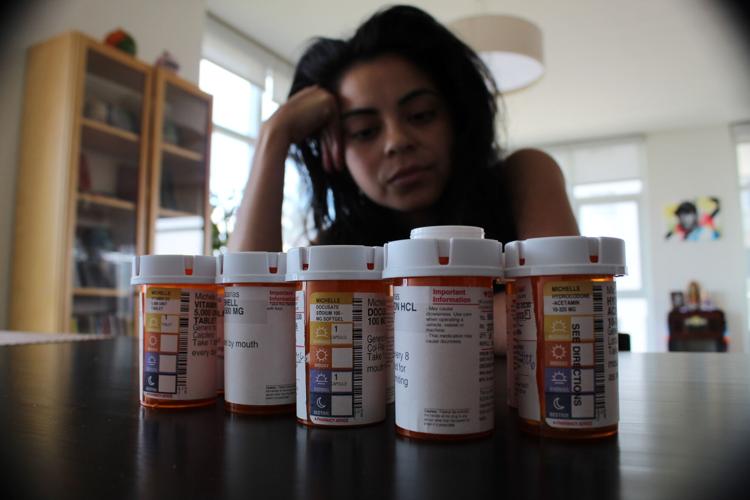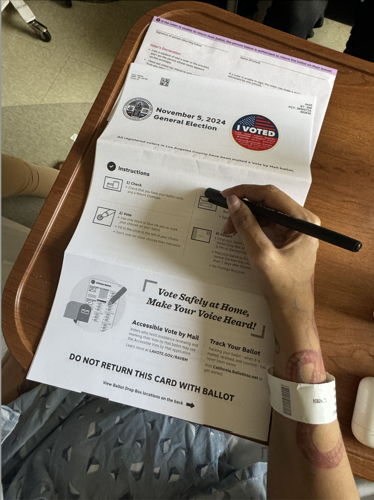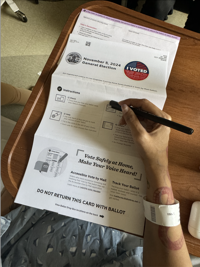
Michelle examines the plethora of medicine prescribed throughout her cancer treatment (image credit: Michelle Zacarias)
I wrote the breaking news story on Donald Trump’s second victory from a hospital bed.
I had contracted a bacterial gut infection during my ongoing chemotherapy and my body, already weakened by the cancer treatment, nearly shut down. When I admitted myself to the emergency room in late October, my vital signs were not good. I had a 103-degree fever, my potassium level was very low and so was my white blood count.
I thought my hospital stay would be just a few days. It stretched to nearly two weeks, overlapping with Election Day. So I found myself watching the results unfold while I lay plugged into my I.V. drip. Yet the stark emotions I experienced in 2016 when Trump defeated Hillary Clinton, were absent. The shock, the sense of betrayal–gone. Instead, it felt more like witnessing an inevitable but unwanted outcome: not surprised, but perpetually disappointed by the country I live in.
In the days following, Republicans seized control of both the Senate and the House of Representatives in 2025, a seismic shift that will shape the next four years of our political landscape—and present new, daunting challenges for our already strained healthcare system.
I couldn't help but reflect on what that meant for people like me. Admittedly, I am jaded from a decade of political reporting, but I remain committed and hopeful in our ability to co-create a world where disabled, chronically ill and vulnerable people in our healthcare system no longer live in fear for their livelihoods.
But what does that world look like under a second Trump presidency?
My mind goes to one of Trump’s longstanding campaign promises: to repeal the Affordable Care Act (ACA), informally known as Obamacare.
Healthcare reform is at risk
For cancer patients, the potential loss of vital ACA protections like guaranteed coverage for pre-existing conditions and Medicaid expansion could be devastating.
While I’m under a private insurance company, a record 45 million people are currently enrolled in Marketplace or Medicaid expansion coverage under provisions of the ACA.
The ACA prohibited insurers from denying coverage or charging higher premiums based on pre-existing conditions–crucial for cancer patients. Without this protection, those diagnosed with cancer could face denial of coverage or prohibitively high premiums, making it harder to access necessary treatments.
Similarly, the ACA also expanded Medicaid coverage in many states to low-income individuals, including those with cancer. If Medicaid expansion is rolled back, many cancer patients could lose affordable care or face higher out-of-pocket costs, putting life-saving treatments out of reach.
Deny, defend, depose
This month, a shooting in midtown Manhattan brought to light growing frustrations with the insurance industry and its role in the U.S. healthcare system. A 26-year-old man, Luigi Mangione, allegedly shot and killed United Healthcare C.E.O. Brian Thompson in New York City. The words “deny,” “defend” and “depose” were scrawled on bullet casings found near the scene.
Those words refer not only to the alleged tactics insurance companies are accused of to avoid paying claims, but they are also evidence of the inherent injustices within the American healthcare system, a protest against a system many view as deeply flawed.
After the shooting, social media reactions were overwhelmingly characterized by indifference toward Thompson, even joy over his demise. A rare moment of bipartisan unity emerged as people across the political spectrum followed updates on the manhunt, with many sharing memes, often in support of the gunman. Mangione was eventually apprehended while dining at a McDonald's in Altoona, Pennsylvania.
One might ask: what kind of person takes pleasure in another’s death? Perhaps that question is more fitting for those who wield the power in the healthcare industry, making decisions that determine whether a life is saved—or whether it is allowed to end.
The uncomfortable reality is that poor and working-class individuals grappling with chronic illness, diseases (like cancer), and limited access to preventive care confront this harsh truth every day. For many, decisions about life and death are not abstract but a constant part of their struggle for survival.
Thompson’s death symbolized a reckoning with a system many see as exploiting people's health for profit. UnitedHealthcare Group, notorious for denying more medical claims than many other insurers, has long been a target of criticism for prioritizing profits over patient care. They have also faced accusations of utilizing artificial intelligence to automate claims reviews, increasing the likelihood of denials. The public response to the shooting underscores a broader, simmering frustration with the privatized healthcare system, which many feel places corporate interests above the well-being of ordinary people.
Many Americans, like myself, have suffered under the weight of exorbitant medical bills, denials of care and the bureaucratic labyrinths of insurance claims. In addition to navigating these barriers in the face of serious medical conditions, having battled cancer twice I have also endured the lifelong consequences of delayed diagnoses and the absence of preventive healthcare options.
This is why many people have voiced frustration over privatized healthcare. For these individuals, Thompson’s killing symbolized the rage they feel toward a system that often prioritizes corporate profits over human lives. This tension reflects a growing disillusionment with the healthcare system, which many argue disproportionately benefits the wealthy while leaving the most vulnerable without adequate care.
Healthcare issues are a matter of life and death
As Trump prepares for his second term, many look to alternatives to privatized insurance companies. For cancer patients, the future of the ACA is a matter of survival. Protections for pre-existing conditions and Medicaid expansion are lifelines, and any changes to these provisions could significantly impact their access to treatment and financial security.
Since 2017, healthcare providers and organizations have opposed Republican efforts to dismantle the ACA, following attacks on the landmark legislation under the first Trump administration. The most significant moment came in 2017 when the Senate narrowly voted 51-49 to reject a bill aimed at repealing the ACA. The late Senator John McCain, in a deeply symbolic act, cast the decisive vote against his own party—a rare act of political courage in defense of the nation's healthcare system.
This time, it is unlikely the Republican-dominated Congress will deviate from party loyalty.

Filling out a mail-in election ballot from the hospital bed (Image credit: Michelle Zacarias).
Trump has nominated celebrity surgeon Dr. Mehmet Oz to head the Centers for Medicare & Medicaid Services (CMS), the federal agency that oversees health programs that provide coverage to nearly half of all Americans.
This pick is on track for a president who is already elevating high-profile figures with little to no experience to key government positions. But this choice goes beyond the spectacle of a celebrity appointment. It suggests the dangers of what the next Trump term could mean for our healthcare system.
Oz has no formal training in public health policy or administration, the core skills needed to steer an agency that manages essential healthcare services like Medicare, Medicaid and the ACA. This is particularly concerning given CMS’s central role in managing the complex landscape of healthcare coverage, which affects not only the elderly and low-income Americans but also a significant portion of the working class.
Beyond the immediate concerns about Oz’s qualifications, this nomination reflects a broader strategy that may shape the administration’s approach toward healthcare. If confirmed, Oz could push for policies that align more with the interests of private healthcare companies and corporate donors than with the needs of the millions of Americans who rely on CMS-administered programs for basic coverage.
Oz’s nomination is more than just an eyebrow-raising spectacle. It’s a harbinger of the direction in which the Trump administration may steer the nation’s healthcare system. As distressing, when asked recently if he had an actual plan for health care, Trump doubled down on his long-standing goal of repealing the ACA as part of his “concepts” of a plan.
With Republicans controlling both chambers of Congress, the next four years could see a significant rollback of healthcare protections, an erosion of access for vulnerable populations and an unchecked rise in corporate influence over public health policy.
For cancer patients and survivors like me, the future of our healthcare is not just a policy debate. As discussions continue over the future of the ACA, and privatized healthcare, it is essential to keep in mind the real-world impact on vulnerable populations, particularly chronically ill and disabled people who rely on these provisions to secure coverage and treatment.
The threat of losing these protections has prompted many patients and advocates to speak out, urging lawmakers to consider the human costs of dismantling the ACA. Whether through repeal, replacement or modification, any changes to the law must take into account the profound impact they could have on the ability of working-class patients to access the care they need.
I refuse to spend another election cycle stuck in a hospital bed at the mercy of politicians backed by private healthcare providers. And I refuse to accept a society where people are pushed to desperation—resorting to violence as a form of justice. This won’t change as long as we let presidents, politicians and CEOs dictate healthcare policy. They’ve proven time and again that they lack the moral integrity to put people first.
So maybe, just maybe, these unprecedented times demand an entirely new approach.
Get stories like these delivered straight to your inbox. Sign up for the CALÓ Newsletter.












(0) comments
Welcome to the discussion.
Log In
Keep it Clean. Please avoid obscene, vulgar, lewd, racist or sexually-oriented language.
PLEASE TURN OFF YOUR CAPS LOCK.
Don't Threaten. Threats of harming another person will not be tolerated.
Be Truthful. Don't knowingly lie about anyone or anything.
Be Nice. No racism, sexism or any sort of -ism that is degrading to another person.
Be Proactive. Use the 'Report' link on each comment to let us know of abusive posts.
Share with Us. We'd love to hear eyewitness accounts, the history behind an article.